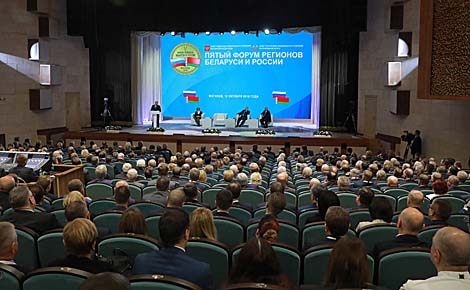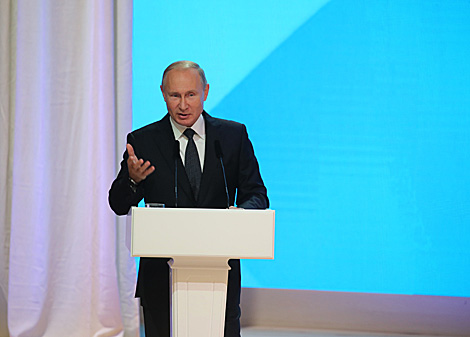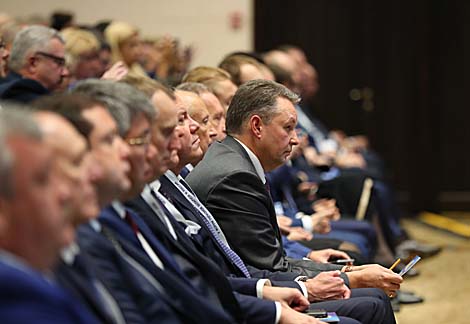Opinions & Interviews
Putin: Belarus and Russia can raise the bilateral trade to $50bn

MOGILEV, 12 October (BelTA) – Belarus and Russia are capable of raising the bilateral trade up to $50 billion, BelTA learned from President of Russia Vladimir Putin during the fifth Forum of Regions of Belarus and Russia in Mogilev on 12 October.
The Russian leader stressed that Belarus is Russia’s top trade partner among the CIS states, with Russia buying roughly half of Belarus’ export. In 2017 Belarus-Russia trade rose by nearly one fourth and reached $32.4 billion. In January-August 2018 Belarus-Russia trade rose by another 14.5%. “We are quite capable of raising the bilateral trade to $50 billion,” said Vladimir Putin.
To illustrate the scale of Belarusian-Russian cooperation, Vladimir Putin reminded that Russia’s trade with India with its population of over 1 billion people is close to $10 billion. “It speaks volumes about our level of cooperation. We pay close attention to the enhancement of investment cooperation. The volume of Russian capital investments poured in Belarus has exceeded $4 billion,” stressed the Russian leader.
 Vladimir Putin also noted that nearly 2,500 enterprises with Russian capital operate in Belarus. The construction of the Belarusian nuclear power plant is the largest joint project. “The first power-generating unit will be commissioned in late 2019. The entire nuclear power plant will be commissioned in 2020,” added Vladimir Putin.
Vladimir Putin also noted that nearly 2,500 enterprises with Russian capital operate in Belarus. The construction of the Belarusian nuclear power plant is the largest joint project. “The first power-generating unit will be commissioned in late 2019. The entire nuclear power plant will be commissioned in 2020,” added Vladimir Putin.
In his words, the construction of the Belarusian nuclear power plant will improve energy supply, the situation in economy, and will open up additional export opportunities. There are plans to build another important installation – a nuclear research and technology center. “We are not just building a very important industrial facility. We are creating a new economy branch in Belarus. Certainly, as part of the Soviet Union Belarus was famous for its scientists, high education standards, but there was no separate economy branch like that. There will be one now,” assured the Russian president.
Vladimir Putin also remarked that dozens of industry-specific programs are being implemented within the framework of the Union State of Belarus and Russia. The efforts are focused on creating cutting-edge science-intensive products, on encouraging Belarusian and Russian private companies to more vigorously embrace innovations in the real economy sector.
 Apart from that, Belarus and Russia work together to advance integration processes in the Eurasian space. “Certainly, we have a lot of debates about these matters. We have many interests, which sometimes fail to coincide, but we are resolute to go along this road. We are moving towards a common goal,” stated Vladimir Putin.
Apart from that, Belarus and Russia work together to advance integration processes in the Eurasian space. “Certainly, we have a lot of debates about these matters. We have many interests, which sometimes fail to coincide, but we are resolute to go along this road. We are moving towards a common goal,” stated Vladimir Putin.
Russia and Belarus are now facing similar challenges and problems. The number includes ways to ensure sustainable economic growth in the long run and the enhancement of the competitive ability on foreign markets. Among the priority areas where Belarus and Russia intend to achieve maximum economic effect Vladimir Putin mentioned import substitution, manufacturing cooperation, agriculture, civil engineering, pharmaceutics, and government procurement. Work is in progress to mutually adjust the national laws and form a common legal environment.
Speaking about interregional cooperation, Vladimir Putin noted that virtually all the constituent territories of the Russian Federation maintain direct ties with Belarusian regions. Dozens of new agreements and commercial contracts have been signed as a result of this forum. “It is important that the agenda of the forum draws close attention to digital economy matters,” stressed the Russian leader.
 Vladimir Putin noted it is important to encourage exchange programs and joint projects in education and science, important to put efforts into the sphere of youth policy. “It is important to encourage the civic engagement of young people and their inclusion in social and humanitarian programs,” said the Russian president.
Vladimir Putin noted it is important to encourage exchange programs and joint projects in education and science, important to put efforts into the sphere of youth policy. “It is important to encourage the civic engagement of young people and their inclusion in social and humanitarian programs,” said the Russian president.
In his speech Vladimir Putin also mentioned the common task of preserving the historic memory, in particular, memory about the victory in the Great Patriotic War of 1941-1945.







 print version
print version make home page
make home page add to bookmarks
add to bookmarks

